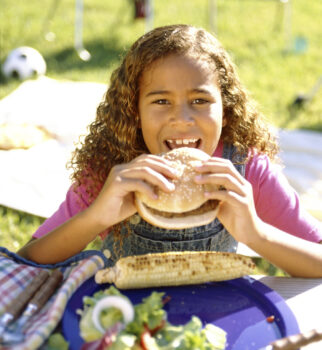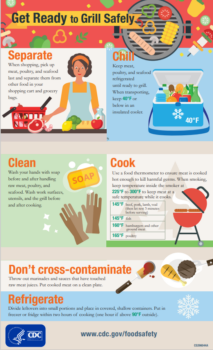 Summer fun includes gathering outdoors at picnics, barbecues and cookouts. These events are a time for bonding with friends and family while sharing food and making memories.
Summer fun includes gathering outdoors at picnics, barbecues and cookouts. These events are a time for bonding with friends and family while sharing food and making memories.
A little preparation and attention to safety can help ensure the gatherings leave your family content and well rather than sick or injured.
While food safety is crucial all year long, the risk of food-borne illness increases when warmer temperatures allow bacteria to grow faster — and when refrigeration is trickier.
And while group gatherings are a good time for all ages, it’s easy to lose track of who’s on point for watching the kids when there’s set-up, cooking and socializing to be done.
On the Pulse offers safety tips for barbecue, cookout and picnic summer celebrations.
Food and grill safety
First up, before handling food to cook or eat, make sure to practice good hand washing. Wash your hands well with soap and warm water, scrubbing for at least 20 seconds.
Remember to wash after touching raw meats and seafood before moving on to the next task. Hand washing can cut down on spreading foodborne illness.
Keep raw foods and cooked foods separate and wash surfaces, knives and other tools that have touched raw meat or seafood well before using them on or near other foods. Just like at home, remember to rinse fresh fruits and vegetables with running water before cutting or biting into them.

Store foods at the right temperature before cooking and after serving. Keep foods that require refrigeration in the fridge or a cooler with plenty of ice, so they stay below 40°F. Marinate meat while in the fridge or cooler, not left out on the counter or table.
Cook meat thoroughly, using a thermometer rather than judging doneness by look. Hamburgers are done at 160°F and chicken needs to cook until it reaches 165°F.
Keep kids away from the grill and remember to place matches, lighters and lighter fluid safely out of reach. Never leave a grill unattended and have a spray bottle or water nearby in case you need to put out a flame.
Some people are surprised to learn that wire brushes used to clean grills can sometimes leave behind bristles that stick to food and cause injury. Consider using a coiled non-wire brush, pumice stone or wadded up foil (when the grill is cool enough) to clean your grill grates instead.
After the meal, put leftovers that need refrigeration back in the cooler or refrigerator within two hours, or within one hour if it’s a 90-degree day or hotter.
Set kids up for safe play
While the adults are busy with cooking and visiting, the kids will likely be ready to get to their own fun. Make sure to talk through boundaries and expectations with your child, and make them aware of potential safety issues, like a parking lot near the playground or a ball field with foul balls flying nearby.
Send an adult along to supervise if young children are involved, and have older kids use the buddy system, so no one is on their own, away from the group. When adults swap out supervision duties, let the kids know and make a clear handoff, catching the new adult monitor up on any issues to track.
Provide extra supervision in and near water
If play in or near the water is part of the fun, have the kids wear properly fitting, U.S. Coast Guard-approved life jackets and assign an adult to be the water watcher. A water watcher remains distraction-free and watches the kids around or in the water, staying within touching distance of young children and non-swimmers.
Drowning can happen quickly and quietly and is a leading cause of death for kids and teens, so supervise closely and carefully when water is nearby during your summer activities.
Along with the food, cooking tools, washing supplies and life jackets, pack the sunscreen and lots of water, and enjoy some fun this summer!

